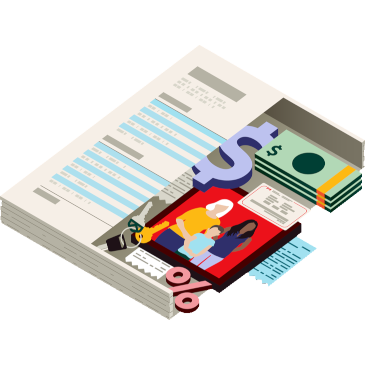Key takeaways:
Whether you’re self-employed, working for an employer or earning investment income, submitting your tax return ensures compliance with the Canada Revenue Agency (CRA) and allows you to access tax credits and benefits. However, failing to file — or filing late — can lead to financial penalties, interest charges and even legal consequences.
It's essential to understand how tax filing works in Canada, who is required to file, and what happens if you don’t file your taxes.
For most people, filing taxes in Canada is mandatory. Your tax dollars help pay for necessary services and programs such as roads, railways, schools, healthcare and hospitals. The shared financial responsibility of paying taxes, like income tax on your earnings, goods and services tax (GST) on purchases and property taxes for homeowners, makes Canada’s infrastructure possible.
In Canada, the tax year runs from January 1 to December 31, with personal tax returns due by April 30 of the following year. If you are self-employed, you have until June 15, but any taxes owed are still due by April 30.
Most Canadians file their taxes electronically through CRA-approved software or by mailing a paper return. The CRA uses this information to assess your income, determine your eligibility for benefits and ensure you have paid the correct amount of taxes.
Filing taxes is an obligation for both Canadian residents and newcomers, including immigrants, international students and temporary foreign workers.
You must file a tax return if:
- You received a Canadian-sourced income
- You earned income that requires reporting, such as self-employment earnings or rental income
- You owe the government money
- You want to claim a refund or benefit, such as the GST/HST credit, Canada Child Benefit (CCB) or Old Age Security (OAS) supplement
- You have earned over the basic personal amount, which is $16,129 for 2025, including minors and domestic or international students
Even if you didn’t earn any income, filing a tax return ensures continued access to government benefits and tax credits.
Whether you forgot or kept putting it off until it was too late, not filing your taxes can lead to financial and legal consequences. Here’s what you need to know:
- Late-filing penalties
If you owe taxes and miss the deadline, the CRA will impose a late-filing penalty of 5% of your balance owing, plus 1% for each additional month you are late, up to a maximum of 12 months. If you have been penalized in the past, the penalty increases to 10% of your balance owed, plus 2% for each additional month, up to 20 months.
- Interest charges on taxes owed
In addition to penalties, any unpaid tax balance accrues daily interest starting May 1. The CRA adjusts its interest rates quarterly, and they are compounded daily, making the debt grow quickly. This is one financial mistake that can really cost you in the long run.
- Loss of tax benefits and refunds
Failing to file can result in the suspension of benefits such as:- Canada Child Benefit (CCB)
- GST/HST credits
- Old Age Security (OAS) supplement
Additionally, if the government owes you money and you’re entitled to a refund, you won’t get it until you file — and you'll want to make the most of that extra money.
- CRA collections and wage garnishment
If you owe taxes and fail to file, the CRA has strong collection powers, including being able to significantly impact the bottom line of your pay cheque. It can:- Garnish your wages or bank account
- Withhold future tax refunds or benefits
- Place a lien on your property
Unlike private creditors, the CRA doesn’t need a court order to take these actions.
Did you know?
According to the CRA, you should generally keep tax records and supporting documents for six years from the end of the last tax year for which you filed an income tax return. To be safe, it is often best practice to keep all supporting documents for seven years.
If you fail to file for multiple years, your tax debt can grow significantly due to penalties and interest. The CRA may roughly calculate your income and issue an estimated assessment, meaning you could be charged more than you actually owe.
The CRA offers a Voluntary Disclosures Program (VDP), which allows you to come forward voluntarily to correct past errors or omissions from returns. If accepted, you may avoid penalties and reduce interest charges.
While most tax cases result in financial penalties, willful tax evasion — including failure to file for multiple years — can lead to criminal charges.
If convicted under the Income Tax Act, penalties include:
- Fines ranging from 50% to 200% of taxes owed
- Up to five years in prison in extreme cases
That said, going to jail is rare and typically reserved for cases of fraud or deliberate tax evasion.
Filing your taxes on time contributes to your overall financial well-being and that of our communities, which benefit from taxes collected. Missing deadlines can result in penalties, interest and the potential loss of government benefits, which can significantly impact your finances.
If you’ve fallen behind, it’s never too late to correct the situation. Seeking professional guidance or using the CRA’s Voluntary Disclosures Program (VDP) can help you correct past mistakes and regain financial stability and control.
If you need help completing and filing your return, meet with a tax professional or tax filer. You may also be able to get assistance and tax tips from free tax clinics run by the Community Volunteer Income Tax Program (CVITP).

